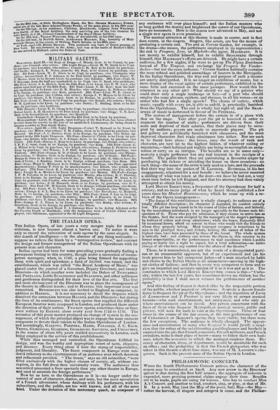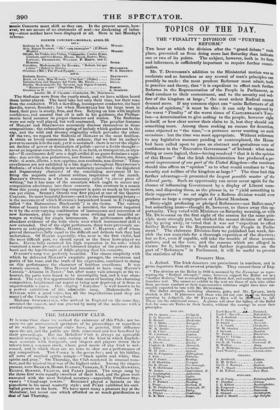PHILHARMONIC CONCERTS.
WHEN the fourth Philharmonic Concert arrives, the character of the season may be considered as fixed. Any new arrow in the Directors' quiver is shot during the first half season ; the aggregate of industry is expended, more pressing personal claims engage their time. Benefits are to be made, pupils are suing for lessons. One has to conduct Miss A.'s Concert, and another to lead, conduct, sing, or play, at that of Mr. B. In a word, May (not the May of the poets, but) May—the May— rather the harvest, of singers and scrapers is come, and the Philhar-
motile Concerts must shift as they can. In the present season, how- ever, we are secure of no abatement of zeal—no slackening of indus- try—since neither have been displayed at all. Here is last Monday's scheme.
Sinfonia in D, No. 5 Aria, Signor Ivarroro, "Oh I cam immagine" Mauto
Magico) MosaaT. Ottetto, for Violin, two Violas, Violoncello, Contra Basso, Clarinet, and WO Horns, Messrs. DAVID, BASSO, HILL, LINDLEY, DRAGONETTI, WILLMAN, P. HARDY, and C
S HARPER POHR.
Cavativa, Mademoiselle DE Rivitas, "Robert, tot que j'aime" (Robert to Diable) MEVERBEER. Overture (MS.) The Wood Nymp/is W. S. BENNETT.
ACT IL
SiOlOnta Eroica REartiovv.v.
Recit. ed Aria, Miss MAssoN. " Cho Aire" (Orfeo)
Introduction and Russian Air Val*, Mr. DAVID DAVID. Duetto, Mademoiselle DE RIMERS: and Signor Iv/awry,
"Rasserena o caro " (Buglielmo Tell) Ressist.
Overture in D A. ROMBERG. Leader, Mr. F. CRAMER—Conductor. Mr. Moscuoccs.
The Sinfonias were from the yearly stock, and we have seldom heard them better played. The band take not only their time, but their tone from the conductor. With a dawdling, incompetent conductor, the band dawdle, waver, flounder; but when MOSCHELES has his large team in hand, their pace is steady, firm, and free. Relying on him with implicit confidence, and assured that all is safe in his guidance, the Philhar- monic band assumes its proper character and station. The Sinfonias were not only well played, but well contrasted. The peculiar features of MOZART and IlseruovEN accurately disclose themselves in these compositions ; the exhaustless spring of melody which gushes out in the one, and the wild and dreamy originality which pervades the other. Of the two, we regard the Sinfonia of MOZART as the most faultless. A strain so lovely commences his andante, that we fear its author's power to sustain it to the end; yet it is sustained : there is never the slight- est decline of power or diminution of polish—never a feeble thought— never an impotent conclusion. All, too, is as lucid, as transparent, as crys-
FOURTH CONCERT—NONDAY, APRIL 22.
ACT I. MOZART.
tal—"Il condiment° arte e degli artifizi di nu gusto finissimo e squi- sito : non servile, non pedantesco, non forzato : ma libero, fermo, magis- trale : si sente, diletta, e non opprime, non confonde, non distrae." These excellences are not exhibited in a like degree throughout BEETHOVEN'S Sinfonia ; of which the dignity is not uniformly sustained; the disjointed and fragmentary character of the concluding movement ill be- fiting the majestic and almost sublime inspiration of the march. BENNET's Overture is what is commonly called "a clever piece of writing," but it has none of the essentials which ought to secure any composition admittance into these concerts. One overture in a season from this young and improving composer is quite as much as his merit can yet claim. SPOHR'S Ottetto was first played at one of the Quartet Concerts. Its most beautiful feature—and it is one of surpassing beauty— is the movement of which HANDEL'S harpsichord lesson in E (vulgarly called " the Harmonious Blacksmith") is the theme. The various forms of beauty into which this air is moulded, the interest imparted to it by the ever-varying combination of instruments and succession of new harmonies, place it among the most striking and beautiful at- tempts at writing for single instruments. Its performance afforded abundant evidence of the wide circle over which instrumental skill is now extended. Out of the eight performers, three were previously un- known as solo-players—HILL, HARDY, and C. HARPER; all of whom proved themselves fully equal to the difficult and delicate task they had undertaken. Of HA Roy especially, who, next to the first violin, had the most difficult part, we should speak as the finest horn-player we have. DAvin fully stNtained his high reputation in his solo ; which contained a more prominent and laboured display of the powers of his hand and the legerdemain of fiddle-playing titan his concerto. Ivaxores song was perfectly beautiful. The chaste simplicity with which he delivered MOZART'S exquisite passages, the sweetness and purity of his tone, and the truth of his expression, combined to stamp on this performance the character of faultless excellence. It was warmly encored. Miss MAssox had intended to have sung HAynx's -Cantata " Arianna in Naxos;" but, after many vain attempts at the re- hearsal, the parts were found to be incorrigibly bad, and it was aban- doned. The very few opportunities that occur of hearing this charming composition, heightened our regret at being now deprived of it front so unpardonable a. cause. Iler singing " Eurydice" is well known to be a perfect exhibition of this admirable song. Mademoiselle DE RiviinE, with a good voice, has all the imperfections (and they are many) of the French vocal school. Madame STOCKHA I'SEN, who arrived in England on the stone day, attended the concert, and was greeted by many of the audience with a cordial recognition.



























 Previous page
Previous page